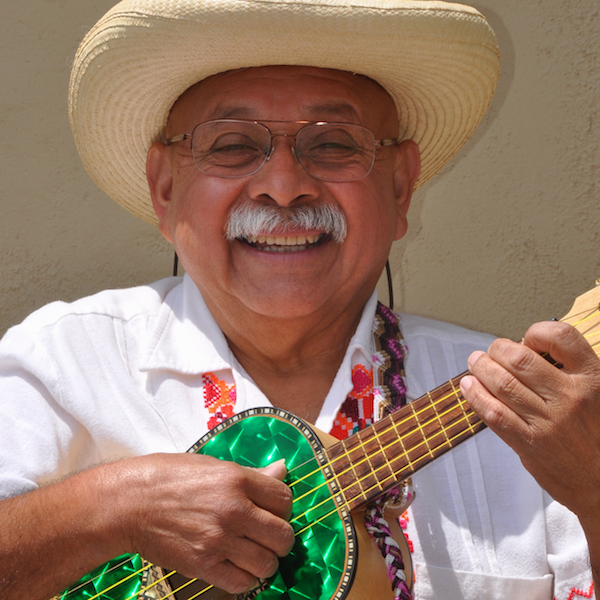Artemio Posadas

Photo by Maria Virginia Prieto Solis
Bio
"I don't know why I was drawn to the son huasteco. I believe it was the falsetto that really got to me, along with the profundity of its poetry."
Artemio Posadas is a musician, dancer, teacher, and tireless cultural organizer, and this year’s Bess Lomax Hawes National Heritage Fellow for his commitment to the Mexican tradition of son huasteco.
The son of a traditional violinist, he was born in 1948 and raised in the northeastern Mexican state of San Luis Potosí, in the cultural region known as La Huasteca. As a youth, Posadas became fascinated with the region’s music known as son huasteco, with its singing style embellished with falsetto breaks and a rich practice of poetic, instrumental, and dance improvisation. He learned the music’s three instruments—huapanguera (large rhythm guitar), jarana (small guitar), and violin—as well as traditional repertoire and dance style. He sought out the region’s best groups as teachers and performed with the Grupo de la Universidad de San Luis Potosí. He worked with the late Beno Liberman to record regional sones for the milestone Antología del Son Mexicano. After touring to the San Francisco Bay area in 1973, he was invited back in 1974 to give workshops to local music and dance enthusiasts in the Mexican-American community. He resettled in the Bay Area in 1979 and later became a United States citizen.
In northern California, he performed with local musicians and since 1990 has taught the son huasteco (along with the son jarocho and other regional forms of son) at Richmond’s East Bay Center for the Performing Arts, helping to anchor the growth and understanding of authentic son in the greater San Francisco Bay Area. During this time, Posadas served as master teacher under apprenticeship grants from the National Endowment for the Arts. He accompanied several ballet folklórico companies, including the prominent Los Lupeños de San José, and consulted with them on traditional son huasteco music and dance styles. A major contribution to the burgeoning practice of traditional Mexican music in California was his insistence on keeping the son huasteco part of social life as well as staged performance. He rented halls, recruited musicians, and organized fandango events that invited people to eat, drink, and perform son huasteco as a social experience. Musician, anthropologist, and Posadas disciple Russell Rodriguez sums up Posadas’s contributions: “The arrival of Artemio Posadas to the Bay Area of California was a blessing. He modeled how traditional arts, such as the dance, poetry, and music of the son mexicano, are significant in our daily lives.”
Posadas produced two recordings of the renowned trío huasteco Los Camperos de Valles. One of these recordings, El Ave de Mi Soñar, featuring Artemio’s original poetry, was released in 2005 by Smithsonian Folkways Recordings, and one track of which appeared in the movie A Better Life. In 2005 and 2009, he participated as a dancer with Los Camperos de Valles in the Smithsonian Folklife Festival, and in 2014, he was featured in the Library of Congress American Folklife Center’s “Home Grown” concert series, an event produced by the Alliance for California Traditional Arts.
Bio by Dan Sheehy, 2015 Bess Lomax Hawes NEA National Heritage Fellow

